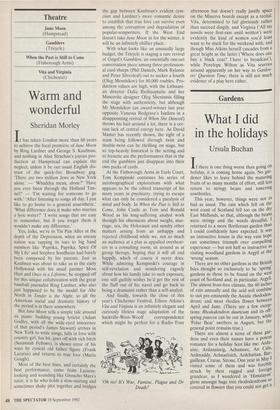Theatre
June Moon (Hampstead)
Gamblers (Tricycle) When the Past is Still to Come (Finborough Arms) Vita and Virginia (Chichester)
Warm and wonderful
Sheridan Morley It has taken London more than 60 years to achieve the local premiere of June Moon by Ring Lardner and George S. Kaufman, and nothing in Alan Strachan's joyous pro- duction at Hampstead can explain the neglect, unless it be our usual English dis- trust of the quick-fire Broadway gag. `There are two million Jews in New York alone.' — 'Whaddya mean, alone?' Have you ever been through the Holland Tun- nel?' — 'I'm waiting for someone to go with.' After listening to songs all day, I just like to go home to a general anaesthetic.' `What difference does it make who marries a lyric writer?' I write songs that are easy to remember, but if you forget them it wouldn't make any difference.'
Yes, folks, we're in Tin Pan Alley at the depth of the Depression, when an uneasy nation was tapping its toes to big band numbers like 'Paprika, Paprika, Spice Of My Life' and Stephen Sondheim had barely been composed by his parents. Just as Kaufman was about to take us to the early Hollywood with his usual partner Moss Hart and Once in a Lifetime, he stopped off for this unique collaboration with the great baseball journalist Ring Lardner, who also just happened to be the model for Abe North in Tender is the Night, so all the American social and dramatic history of the period is in there somewhere.
But June Moon tells a simple tale around its piano: budding young lyricist (Adam Godley, with all the wide-eyed innocence of that period's James Stewart) arrives in New York to write songs, falls in love with country girl, has hit, goes off with rich bitch (Susannah Fellows), is shown error of his ways by cynical old father figure (Frank Lazarus) and returns to true love (Maria Gough).
Most of the best lines, and certainly the best performance, come from Lazarus: looking and sounding like Groucho Marx's tutor, it is he who holds a slow-starting and sometimes shaky plot together and bridges
the gap between Kaufman's evident cyni- cism and Lardner's more romantic desire to establish that true love can survive even among the corruption and degradation of popular-songwriters. If the West End doesn't take June Moon in for the winter, it will be an infinitely chillier place.
With what looks like an unusually large budget, the Tricycle is staging a rare revival of Gogol's Gamble's, an essentially one-act conversation piece among three profession- al card sharps (Phil Daniels, Mark Rylance and Peter Silverleaf) out to sucker a fourth (Oleg Menshikov) for 80,000 roubles. Pro- duction values are high, with the Lithuani- an director Dalia Ibelhauptaite and her Muscovite designer Oleg Shenintsis filling the stage with authenticity, but although Mr Menshikov (an award-winner last year opposite Vanessa Redgrave's Isadora in a disappointing revival of When She Danced) throws his hair around a lot, there is a cer- tain lack of central energy here. As David Mamet has recently shown, the sight of a scam being followed through twist and double-twist can be thrilling on stage, but so top-heavily historical is the setting and so frenetic are the performances that in the end the gamblers just disappear into their own packs of cards.
At the Finborough Arms in Earls Court, Tom Kempinski continues his series of autobiographical explorations with what appears to be the edited transcript of his many years in psychiatry, trying to escape what can only be considered a paralysis of mind and body. In When the Past is Still to Come, John Castle as Tom and Ronald Wood as his long-suffering analyst work through his obsessions about weight, mar- riage, sex, the Holocaust and sundry other matters arising from an unhappy and rejected childhood while we, not so much an audience at a play as appalled overhear- ers in a consulting room, sit around as at group therapy, hoping that it will all end happily, which of course it never does. While admiring Kempinski's courage in self-revelation and wondering vaguely about how his family take to such exposure, one still guiltily wishes he'd get the rest of the fluff out of his navel and go back to being a dramatist rather than a self-analyst.
And finally, towards the close of this year's Chichester Festival, Eileen Atkins's Vita and Virginia is an infinitely elegant and curiously lifeless stage adaptation of the
Sackville-West–Woolf correspondence which might be perfect for a Radio Four
'Oh no! It's War, Famine, Plague and Dr Death!' afternoon but doesn't really justify space on the Minerva boards except as a recital. Vita, determined to fail gloriously rather than succeed dingily, and Virginia CM my novels were first-rate until written') were evidently the kind of women you'd least want to be stuck for the weekend with, and though Miss Atkins herself cascades from a great height as the latter ('Where does one buy a black coat? I have to broadcast'), while Penelope Wilton as Vita scurries around apparently on her way to Garden- ers' Question Time, there is still not much evidence of a play here either.


























































 Previous page
Previous page